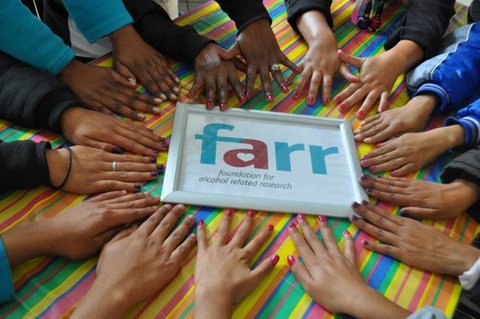
A troubling spectrum
September 9 is International foetal alcohol spectrum disorder (FASD) day – and the graphic used to symbolise awareness of this tragically common problem in South Africa is a white cord, tied in a reef knot.

Armistice Day is marked annually at the 11th hour on the 11th day of the 11th month. Symbolic since that was also when World War I was finally declared over. This same sort of symbolism is why the ninth day of the ninth month has come to mark International FASD day and the interlocking loop of a reef knot is used as the global symbol for FASD.
Nine months is the time that a foetus spends in the womb, utterly dependent on its mother for its development – hence the ninth month and ninth day. The reef knot is representative of the following: the circle for the baby’s head, the human brain and the world; the cord for the umbilical cord and ties to the community; the reef knot itself – the more you pull, the tighter it becomes and the frayed ends indicate the irreparably damaged nervous system which children born with FASD have.

Image AWARE.org
The Foundation for Alcohol Related Research (FARR) reports in its 2021 newsletter that “according to the World Health Organization (WHO) the prevalence of FASD in the world is projected to be 1,5%. South Africa has the highest reported FASD prevalence rates in the world, with rates as high as 28% in some communities. It is estimated that our country’s overall rate is at least 6%.”
“Our highest rate (in the Northern Cape province) is 18 times higher than the global average,” said Dr Leana Olivier, CEO of FARR. Despite this, the broader public remains woefully unaware of the impact of foetal alcohol spectrum disorder (FASD). Other than being one of the most preventable developmental disabilities and birth defects in the world, it causes permanent damage and has major societal and educational impacts. It’s more common than spina bifida, autism and Down syndrome combined and also does not discriminate, occurring at all socio-economic levels.
An article in the Smithsonian Magazine published in February this year noted that it has only been 50 years since scientists began taking note and documenting the effects of in-utero exposure to alcohol. It was first described in a study published in 1973. “At the time, people didn’t believe it,” says Joanne Weinberg, a neuroscientist at the University of British Columbia. Doctors considered the effects of alcohol on the foetus to be relatively benign. Some obstetricians would even administer alcohol intravenously to women who were at risk of a preterm birth in hopes of staving off labour,” the article author Emma Yasinski wrote!
The most successful programme FARR has implemented has been the Healthy Mother Healthy Baby©, conducted with the Department of Health’s antenatal services.
“FASD is caused when a foetus is exposed to alcohol,” the FARR newsletter states. “The alcohol reaches the foetus through the bloodstream of the mother and can cause damage to any of the foetal organs. The brain is the most vulnerable organ. For this reason, all children with FASD have some form of permanent brain damage, presenting as developmental delays, learning and behavioural problems. This is a lifelong condition and cannot be cured by medication.”
Later this year, a study containing the latest prevalence figures will be published Dr Olivier said, highlighting the completion of three projects FARR was engaged in at Graaff-Reinet and Kirkwood in the Eastern Cape as well as at Prince Albert in the Western Cape. “These projects included FASD prevalence studies, as well as comprehensive awareness, prevention and education/capacity development programmes for professionals such as health and medical staff, social workers and educators,” she said.
“We still have community support, training and research projects in the Eastern Cape (Burgersdorp), Northern Cape (De Aar – since 2001, Hanover, Britstown, Petrusville, Philipstown/Keurtjieskloof, Upington and Keimoes), as well as in the Western Cape (Saldanha Bay Municipal Area). Our Training Academy does training nationally.”
The most successful programme FARR has implemented has been the Healthy Mother Healthy Baby©, conducted with the Department of Health’s antenatal services. Dr Olivier said FARR aimed “to implement evidence based interventions or programmes” – developed by FARR staff, researchers, psychologists, social workers, educators and professional nurses.
“We recruit pregnant women before 20 weeks’ pregnancy to enrol in this support and educational programme. All pregnant women are welcome to enrol, we do not only focus on those who are using alcohol.”

There is also support for women exposed to domestic violence, who use any substance of abuse, or women who just want and need support during their pregnancy, she said. “FARR’s project staff are trained to provide health and psycho-social support by means of individual and group therapy sessions, video-sessions and home visits.” Dr Olivier said wherever possible, partners are also involved.
“Once the baby is born, the mother and baby receive a home visit and on-going support. When the baby is nine months old, both the mother and baby are invited to a baby clinic, where a FARR medical specialist, and if needed, a FARR psychometrist, examines the child to ensure that it’s healthy, and developing well. This programme is highly successful and is protecting many babies from being born with alcohol related harm, such as FASD.”
It was essential for partners or fathers, family members and friends to support women of childbearing age, Dr Olivier said. “These women are encouraged to plan their pregnancies (78% of all pregnancies are unplanned), to use contraceptives if sexually active and not wanting to fall pregnant but most importantly, not to drink alcohol during pregnancy.”
There was a fixation with the physical manifestations of FASD, Dr Olivier said, but 70% of children who are diagnosed do not demonstrate the “typical” features. (Those being defined as small eyes, exceptionally thin upper lip, a short, upturned nose, and a smooth skin surface between the nose and upper lip.)
“FASD is prevalent in all cultural, religious and socio-economic groups. There are still many myths around it. Some people still believe, incorrectly, that a woman must be an alcoholic to have a child with FASD. Research has shown that even light to medium alcohol exposure has the potential to cause harm. Therefore, the prevention message that must be spread is: No amount of alcohol is safe during pregnancy. FASD causes permanent damage but can be prevented by alcohol free pregnancies.”
Even small amounts of alcohol can cause irreversible and permanent damage Dr Olivier said. Alcohol is teratogenic – meaning prenatal exposure can potentially damage any of the foetus’ developing organs: heart, eyes, skeletal system etc.
“The central nervous system (brain) starts developing soon after conception, thus the brain is the most vulnerable organ. A child with FASD always has some form of brain damage, resulting in lifelong learning and behavioural challenges.”
Dr Olivier stated that FARR believes in the beautiful African saying: You need a village to raise a child, “but we strive to get communities to understand that you need a village to protect a child from being born with FASD”.
(FARR can be contacted on info@farrsa.org.za or 021 686 2646 for guidance on where to seek help.)
INFO BOX
The majority of people with FASD have no or very little physical signs. It is more important to rather note the developmental and behavioural problems resulting from brain damage which might include some of the following:
Delayed child development
Hyperactivity
Attention problems or deficits (a common misdiagnosis for children is Attention Deficit Hyperactivity Disorder or ADHD)
Difficulty in understanding cause and effect of behaviour
Impulse control challenges (rage and anger or mood swings)
Interpersonal relationship problems
BACK TO TOP